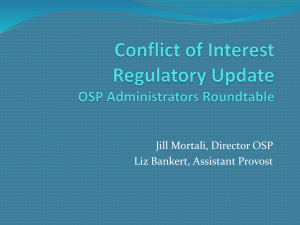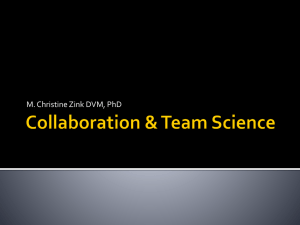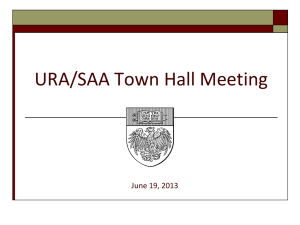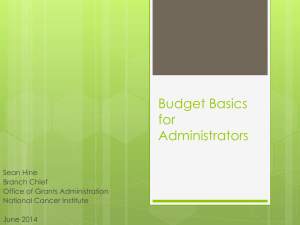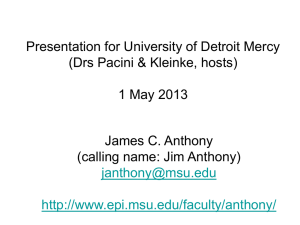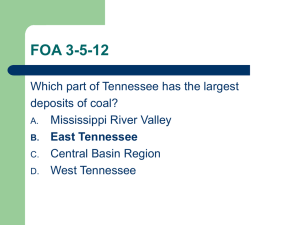Finding Funding Oppotunities: Choosing the Right Grant for You
advertisement
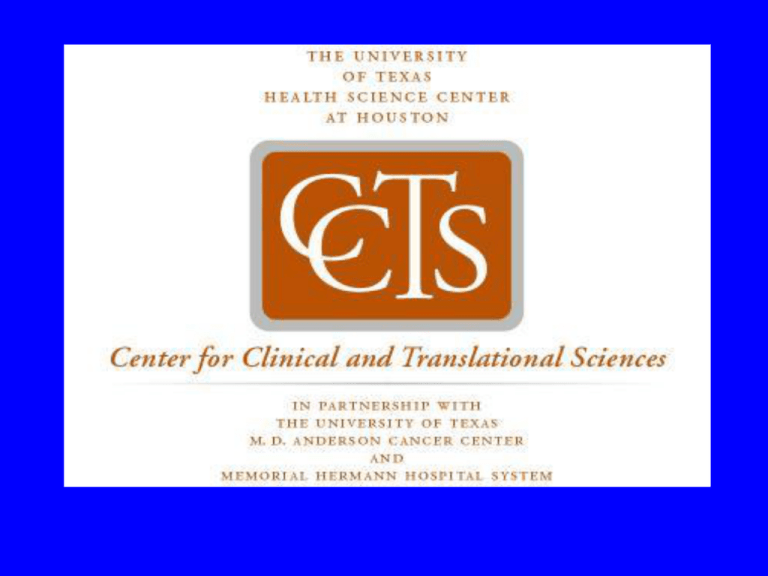
Finding Funding Opportunities: Choosing the Best Grant for You Maureen E. Goode, PhD, ELS Administrative Director Center for Clinical and Translational Sciences Maureen.Goode@uth.tmc.edu 713-500-7924 Start thinking about grants NOW. Learn the types of grants available, how you can keep informed about funding opportunities, and how to choose the kind of grant most likely to be funded. Plan a couple of steps ahead in your career. The choices seem endless…. NIH, NSF, DoD, AHA, MDA, ACS…? NCI, NEI, NIA, NIAAA, NIAID, NIBIB, NICHD, NIDA, NIDCR, NIEHS, NIMH, NINDS, NINR, NIAMS, NIDCD, NIDDK, NIGMS…? R01, R03, R21, T32, P01, P30, K08, K22, K23, IDEA grant, young investigator grant…? Investigator initiated or in response to an FOA? Learn the Language--investigators New investigator = has no major (R01-type ) funding Early stage investigator = new investigator within 10 years of completing terminal research degree or medical residency Learn the Language—grants & applications Grant mechanism = kind of grant (R01, K22, P01, new investigator) Investigator initiated (unsolicited) application= your idea + a general grant mechanism Application in response to an FOA = your idea + an FOA Learn the Language—information FOA = funding opportunity announcement RFA = request for applications PA = program announcement RFP = request for proposals Notice = information about an FOA Learn the Language—your new best friends Funding agency = organization that awards grants IC = National Institutes of Health (NIH) Institute or Center Program officer = funding agency employee managing an FOA Study section = reviewers of your grant application Learn the Language—NIH-specific terms NIH Glossary & Acronym List http://grants.nih.gov/grants/glossary.htm#P7 To choose the best grant for you, ask yourself: •What do I want to do? •How much will it cost? How long will it take? •Where am I in my career? •Who might give me a grant? What do you want to do? •Conduct research Individual and group research grants •Get training Training and career development awards •Train others Departmental & institutional training grants •Hold a scientific or educational meeting •Build new facilities Individual Research Grants One project Examples R = NIH research grants R01—Research Project Grant R03—Small Grant R21—Exploratory/Developmental Grant R41/R42—Small Business Technology Transfer Research Grants R43/R44—Small Business Innovation Research Grants Multiproject Grants Several related projects, sometimes with supporting cores and programs for career development and for funding pilot projects (you could get a grant from a multiproject grant) Examples P = NIH multiproject grants P01—Research Program Project Grant P30—Center Core Grant P50—Specialized Center Grant Career Development/Training Awards •For the development of researchers •Salary support and research funds •Most are for students, fellows, and assistant professors, but some are for more senior faculty •Many are limited to certain career periods (e.g., first 3 years of assistant professorship) and to US citizens or resident aliens •Investigators with other career development awards or R01-type funding are not eligible Examples K, F, and T = NIH career development/training K01—Mentored Research Scientist Award K08—Mentored Clinical Scientist Award K12—Mentored Clinical Scientist Development Award K22 —NCI Transition Career Development Award K23—Mentored Patient-Oriented Research Career Development Award K24—Established Investigator Award F32—Postdoctoral Individual National Research Service Award T32 —Kirschstein Institutional Research Training Award How much will it cost? How long will it take? •All FOAs have time limits •Almost all have budget limits or ranges •For initial planning, an approximate cost is fine-$50,000? $200,000? Millions? •Colleagues and your departmental grants administrator can help you estimate the cost of the research (direct funds) •Indirect funds (which go to your institution) have to be included Where are you in your career? •Graduate student •Postdoctoral or clinical fellow •New assistant professor just beginning a research project •Associate or full professor continuing an established research program •Any professor testing a new hypothesis There are specific grants for all these stages in your career. Graduate Students •NIH grants http://grants1.nih.gov/training/F_files_nrsa.htm •GrantsNet (useful information for everyone) •http://sciencecareers.sciencemag.org/funding •GSBS announces grant opportunities for its students •Check large institutional and departmental training and research grants too Postdocs •NIH grants http://grants1.nih.gov/training/careerdevelopmenta wards.htm (has information for assistant professors too) •GrantsNet http://sciencecareers.sciencemag.org/funding •Check large institutional and departmental training and research grants too Who might give you a grant? NIH Other funding agencies—check eCivis Don’t like the FOA but like the funding agency? OR Want to confirm that you’ve chosen the right grant from that agency? Check the agency’s web site for other FOAs Here’s an example… Department of Defense (DoD) cdmrp.army.mil/funding/default.htm Have been for a variety of diseases. FY11 list is not out yet. Mechanisms: postdoctoral, new investigator, hypothesis-testing (Idea), clinical investigator, and therapy-development awards (varies by disease site) Many emphasize innovative ideas Not restricted to US citizens or resident aliens AFTER READING THE FOA, Get More Information from the Program Officer •Is my project a good fit with the FOA? •If not, are there other FOAs that would be better? •This FOA is about to expire. Will it be reissued? •Who is on the study section? •Will a lot of people apply for this grant? (What are my chances?) •Can you suggest any ways to improve my proposal? Also, thank them—email their institute or foundation directors REMEMBER Contact us to discuss what we can do for you 713-500-7900; CCTS@uth.tmc.edu or Maureen Goode (713-500-7924) Maureen.Goode@uth.tmc.edu Use CCTS services and programs to leverage your grant applications Check our web site for information http://ccts.uth.tmc.edu/ From the New Yorker, December 6, 2010
